Investigate how biblical narratives on race have shaped beliefs, sparking curiosity and debates on its interpretation and impact on modern racism discussions.
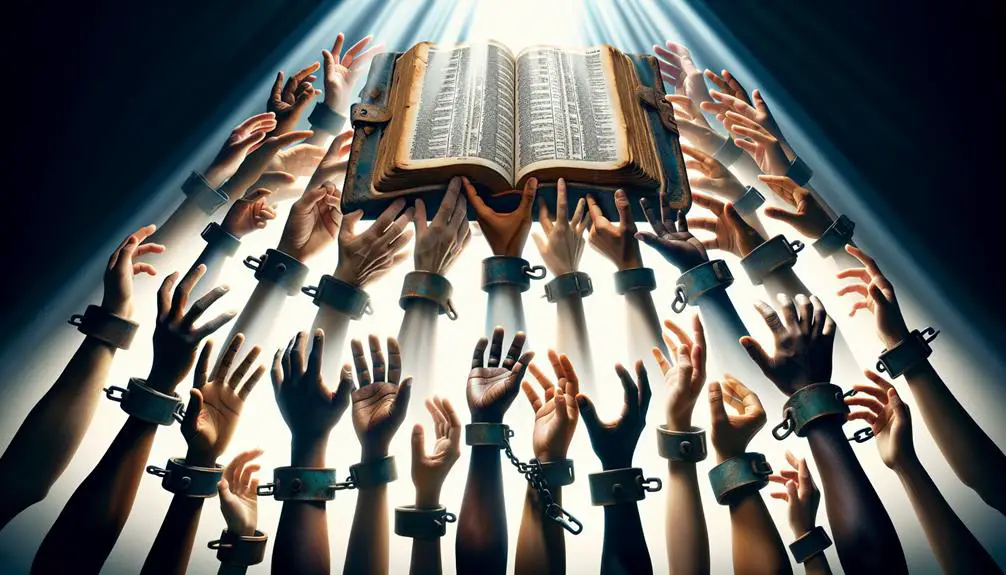
Racism in the Bible
Navigating the topic of racism within the biblical text is akin to opening Pandora's box, revealing complexities and interpretations that have sparked debates for centuries.
You may find yourself questioning how ancient scriptures, written in a time vastly different from our own, continue to influence modern perspectives on race and ethnicity.
From the misinterpretation of the 'Curse of Ham' to the concept of the 'Chosen People,' the Bible's narratives have been wielded to justify both inclusivity and exclusion.
As you explore this intricate topic, consider how historical context and evolving interpretations challenge our understanding of what the Bible says about race, inviting a deeper contemplation of its impact on contemporary discussions of racism.
Key Takeaways
- Biblical narratives are shaped by their historical contexts, influencing interpretations related to race.
- Misinterpretation of scriptures has historically been used to justify racism, reflecting societal biases rather than the texts' core messages.
- The Bible emphasizes themes of equality, love, and universal humanity, condemning discrimination and encouraging inclusivity.
- Modern interpretations seek to address and dismantle racist misreadings, highlighting the Bible's teachings on justice and equality.
Historical Context and Interpretation
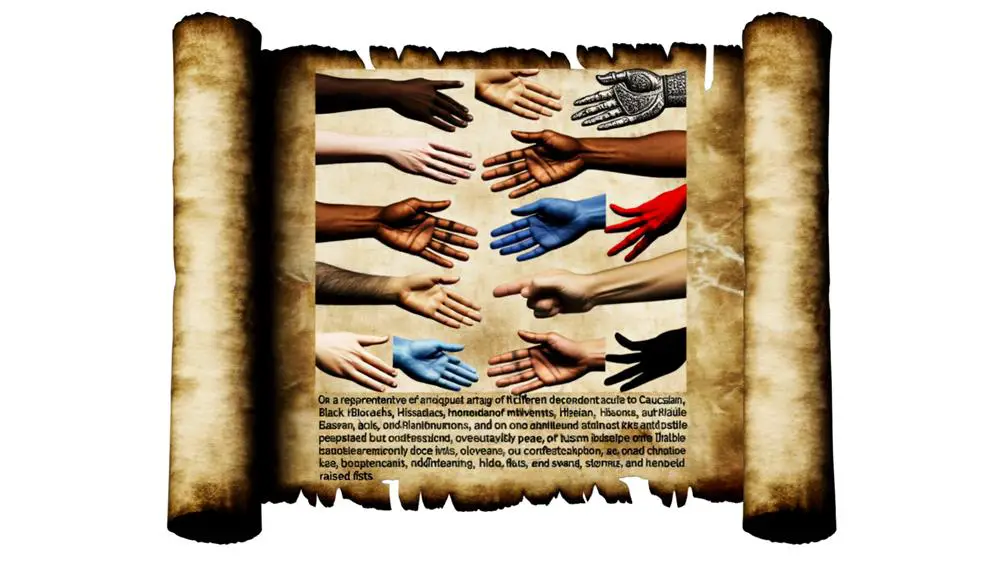
Understanding the historical context and interpretation of biblical texts is crucial in analyzing perceptions of racism within the scripture. When you delve into the genealogical narratives and cultural biases present in the Bible, it becomes apparent how deeply intertwined these aspects are with the ways in which the scripture has been understood and interpreted across different periods and societies.
Genealogical narratives, for instance, often serve as a foundation for understanding the lineage and heritage of biblical figures. These accounts, however, aren't just mere records of ancestry; they're imbued with cultural and historical significances that reflect the values and beliefs of the times in which they were written. You'll find that these narratives can both explicitly and implicitly convey notions of racial superiority or inferiority, depending on how they're interpreted. It's essential to approach these texts with a critical eye, recognizing the cultural biases that may have influenced their composition and how these biases have been perpetuated or challenged over time.
Cultural biases in biblical interpretation have played a significant role in shaping perceptions of race and ethnicity. These biases aren't static; they evolve with societal changes and reflect the prejudices or inclinations of the interpreters. As you dissect these biases, you'll see how interpretations of the same texts can vary dramatically, often in ways that either mitigate or exacerbate perceptions of racism. It's through understanding these historical contexts and the interplay of genealogical narratives and cultural biases that you can begin to unravel the complex ways racism has been perceived in relation to biblical scripture.
Biblical Narratives and Race
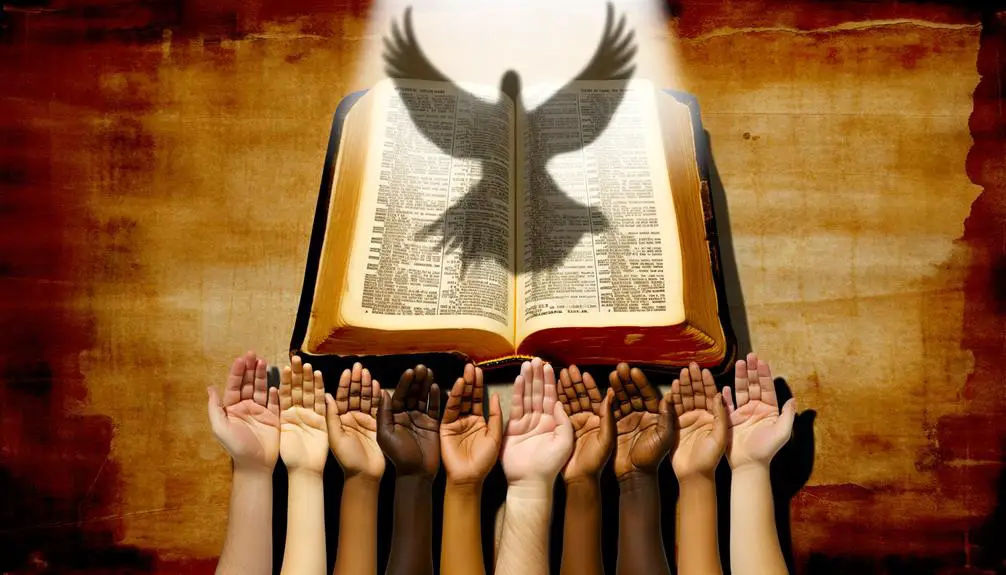
Exploring the connection between biblical narratives and race reveals complex layers of interpretation and representation, deeply embedded within the scripture's historical and cultural contexts. The Bible, a collection of texts from diverse authors across centuries, reflects a rich tapestry of ethnic diversity and cultural interactions. Genealogical narratives, in particular, serve as a cornerstone for understanding these dynamics, offering insights into the ancestries and lineages that define the people within the biblical world.
These genealogical accounts do more than list names; they weave stories that underscore the interconnectedness of different groups and their shared humanity. For instance, the lineage of Jesus Christ, as outlined in the Gospels, includes individuals from various ethnic backgrounds, highlighting the inclusive nature of the Christian message. This aspect of the scripture challenges narrow interpretations that seek to promote racial divisions.
Moreover, the Bible's portrayal of ethnic diversity extends beyond genealogies to narratives that emphasize cross-cultural encounters and marriages, demonstrating the fluidity of ethnic boundaries in ancient times. These stories often carry moral and theological lessons that transcend race, focusing on faith, character, and the universality of God's message.
In analyzing these biblical narratives, it's crucial to approach them with a scholarly objectivity, recognizing the historical and cultural contexts in which they were written. This approach allows for a deeper understanding of how race and ethnicity are represented in the Bible, moving beyond simplistic readings to appreciate the scripture's complex engagement with the human experience.
Misuse of Scripture in Justifying Racism
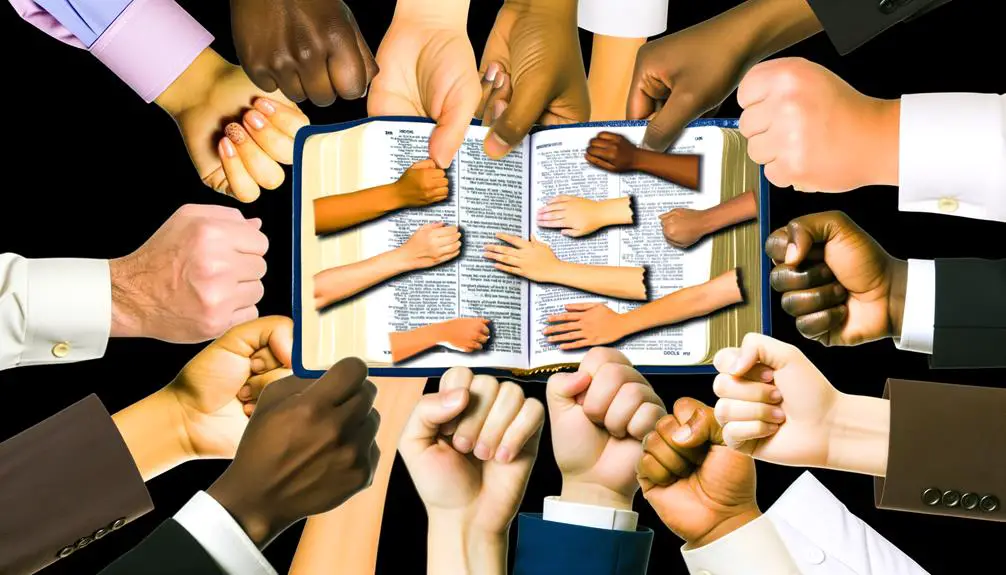
You must consider how scriptures have been misinterpreted to justify racism, often by ignoring the historical context in which they were written. This disregard for context leads to ethical misapplications, where texts are highlighted to support prejudiced views.
It's critical to analyze these aspects to understand the complex relationship between biblical interpretation and racial attitudes.
Biblical Texts Misinterpreted
Throughout history, various biblical texts have been misconstrued to justify racism, with interpretations often reflecting societal biases rather than the scriptures' true intent. This misinterpretation often stems from a lack of understanding regarding textual authenticity and cultural biases present at the time of writing. It's crucial to dissect these misinterpretations to uncover the true, inclusive message of the Bible.
Misinterpreted Text |
Common Misuse |
Corrective Perspective |
|---|---|---|
Curse of Ham |
Justification for slavery |
Misreading; not about race |
Tower of Babel |
Racial segregation |
Misinterpretation; about human pride |
"Chosen People" |
Superiority of one race |
Misunderstood; about a covenant, not race |
Philemon |
Endorsement of slavery |
Contextual; actually about brotherhood |
Historical Context Ignored
Having discussed the misinterpretation of biblical texts, it's crucial to examine how ignoring the historical context of these scriptures has further enabled their misuse in justifying racism.
Cultural anthropomorphism, interpreting ancient texts through modern cultural lenses, often distorts the original intent and meaning. This phenomenon, coupled with a lack of understanding of textual evolution—how these texts have changed, been edited, and interpreted over centuries—leads to profound misapplications.
Without considering the socio-political and economic conditions of the times these texts were written, modern interpretations can severely misrepresent their messages. Such oversights not only simplify complex narratives but also weaponize scriptures against marginalized communities, perpetuating a cycle of exclusion and prejudice under a guise of divine sanction.
Ethical Misapplications Highlighted
One significant ethical misapplication of scripture in justifying racism involves the selective reading and interpretive manipulation of biblical texts. Cultural biases often guide such misinterpretations, leading to harmful justifications of racism. This unethical use of scripture neglects the broader narrative of moral evolution within the Bible, which advocates for equality and love among all people.
- Cherry-picking verses to support pre-existing prejudices.
- Ignoring the context in which certain passages were written.
- Overlooking the Bible's overarching message of love and unity.
- Applying ancient cultural norms to justify modern racial hierarchies.
- Disregarding the progress in theological understanding and moral evolution.
Analyzing these misapplications critically reveals the need to approach sacred texts with a balanced and historically informed perspective, free from personal biases.
The Concept of the Chosen People
You must first understand the historical context behind the concept of the 'Chosen People' to grasp its significance in biblical texts.
Analyzing modern interpretations reveals how perceptions have evolved and sometimes diverged from original meanings.
Lastly, considering the implications for today illuminates the ongoing relevance and potential for misinterpretation of this concept in contemporary discourse.
Historical Context Explored
Delving into the historical context, the concept of the 'Chosen People' in biblical texts reflects complex social, theological, and cultural dynamics that have influenced interpretations of race and ethnicity throughout history. This notion is underpinned by both cultural dynamics and archaeological evidence, providing a multifaceted view of ancient societies.
- Ancient artifacts that suggest early societal divisions
- Inscriptions hinting at theological exclusivity
- Manuscripts detailing cultural practices and beliefs
- Archaeological sites indicating segregated living areas
- Relics that portray ancient rituals and ceremonies
These elements collectively paint a picture of how the idea of a chosen group was both a reflection and a product of the times, deeply intertwined with the social fabric and the prevailing cultural ethos.
Modern Interpretations Analyzed
In contemporary discussions, interpretations of the 'Chosen People' concept in biblical texts have evolved, reflecting shifts in theological, cultural, and racial perspectives. You'll find that cultural biases significantly influence these interpretive frameworks, shaping how communities and individuals understand the notion of being 'chosen' by a divine entity.
Scholars argue that modern readings of this concept often reflect contemporary concerns about inclusivity and diversity, diverging from historical interpretations that sometimes reinforced exclusivist or supremacist views. This evolution in understanding demonstrates a critical engagement with the text, where interpretive frameworks are continuously questioned and reevaluated in light of new cultural and ethical norms.
Thus, the concept of the 'Chosen People' today invites a more nuanced and inclusive exploration, challenging you to reconsider long-held assumptions.
Implications for Today
The concept of the 'Chosen People' has far-reaching implications for contemporary society, shaping discussions around identity, privilege, and the ethics of exclusivity. In exploring this concept, it's vital to recognize its impact on cultural evolution and social integration.
- Cultural narratives that emphasize exclusivity can hinder social integration.
- Privilege, when tied to identity, often leads to societal divisions.
- The ethics of exclusivity challenge our understanding of equality and justice.
- Social integration requires a reevaluation of historical narratives within contemporary contexts.
- Cultural evolution is marked by the blending and respect of diverse identities.
Analyzing this concept encourages a nuanced understanding of how historical religious notions can influence modern societal structures, urging a reconsideration of how we view identity, privilege, and the potential for inclusive communities.
New Testament Perspectives on Ethnicity
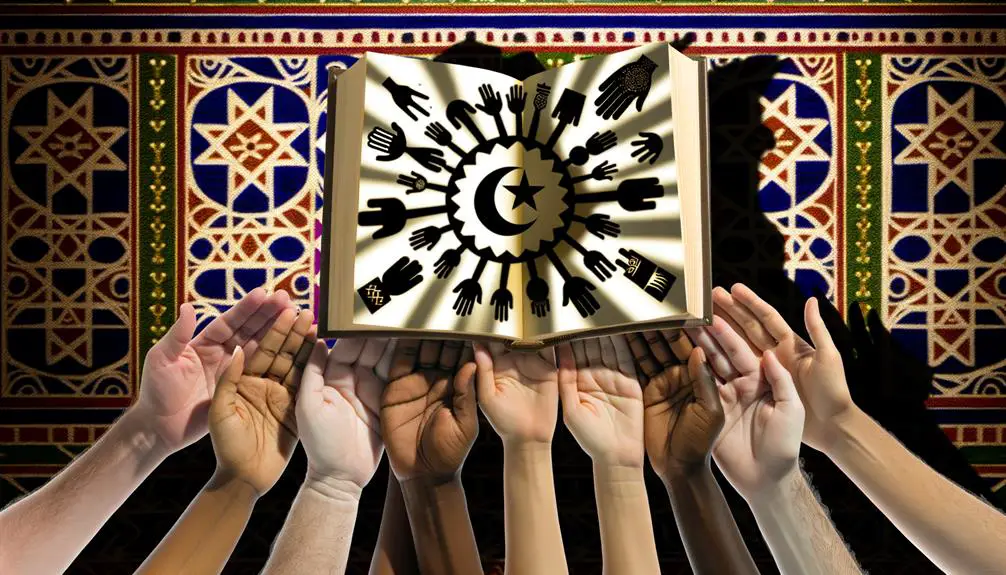
Several New Testament texts challenge prevailing ethnic divisions, advocating for a more inclusive understanding of community. This shift is notably evident in the themes of Gentile inclusion and Jesus' lineage. The New Testament, through its narratives and teachings, often transcends the strict Jewish-Gentile dichotomy that characterized the period.
You'll find that Jesus' lineage, as outlined in the Gospels, plays a crucial role in this discussion. Matthew's genealogy, for instance, includes non-Jewish figures, highlighting a broader, more inclusive heritage. This inclusion isn't merely anecdotal; it serves a theological purpose, underscoring the universality of Jesus' mission. The message is clear: salvation and belonging aren't confined to a single ethnicity but are available to all, irrespective of their background.
Moreover, the theme of Gentile inclusion is further amplified in the Acts of the Apostles and the Pauline Epistles. Paul's letter to the Galatians, for example, emphasizes that in Christ, there's neither Jew nor Gentile, erasing ethnic barriers and fostering a new identity based on faith rather than birthright. This radical inclusivity challenges the ethnic exclusivism of the time, advocating for a community built on spiritual kinship rather than ethnic lineage.
Analyzing these texts, it's evident that the New Testament writers were grappling with the complexities of identity and belonging in a diverse world. Their efforts to redefine community boundaries reflect a profound engagement with the issues of ethnicity and inclusion, offering insights that remain relevant in addressing contemporary challenges of racism and discrimination.
The Influence of Christianity on Slavery

While exploring how New Testament teachings challenge ethnic divisions, it's crucial to examine how Christianity's emergence influenced perspectives on slavery, particularly in shaping attitudes and practices across different societies. Christianity's role in the history of slavery is complex, marked by both complicity and abolitionist efforts. Christian abolitionists, drawing on the teachings of equality and brotherhood in the New Testament, played pivotal roles in movements against slavery. However, the influence of Christianity on slavery wasn't uniform, as interpretations of Biblical texts varied greatly.
Consider these points to visualize the nuanced influence of Christianity on slavery:
- The use of Biblical justifications for slavery by some, contrasted with the passionate opposition from Christian abolitionists who argued that enslavement was fundamentally against Christian teachings.
- The impact of Christian conversion among enslaved populations, which often led to subtle forms of resistance and the formation of a distinct, empowering spiritual identity.
- The role of Christian institutions in both supporting and dismantling the slave trade, highlighting the internal conflicts within the church regarding slavery.
- The influence of secular ideologies and Enlightenment thinking on Christian abolitionists, demonstrating the interplay between religious and secular influences in shaping anti-slavery positions.
- The legacy of Christian abolitionism, which continues to inspire modern human rights movements, showing the enduring impact of faith-based activism.
The relationship between Christianity and slavery reveals a history of contradiction, inspiration, and transformation. It highlights how religious beliefs can be mobilized for both oppression and liberation, shaped by wider social, political, and secular influences.
Modern Reflections and Reinterpretations

In today's society, reflections on and reinterpretations of Biblical narratives reveal a complex tapestry of evolving understandings, particularly regarding the issue of racism. You confront a landscape where scholars and theologians grapple with historical contexts and cultural biases inherent in the Bible's interpretation. This scrutiny is pivotal, as it uncovers how certain readings of Biblical texts have been used to justify racial discrimination, perpetuating societal impacts that reverberate to this day.
You'll notice that modern scholars emphasize the importance of understanding the Bible within its historical context, arguing that interpretations reflecting racist ideologies often stem from anachronistic readings. These interpretations impose contemporary cultural biases on ancient texts, distorting their original meanings. By engaging in rigorous historical-critical methods, you can discern the significant difference between the texts' intentions and their manipulated uses.
Furthermore, you'll see that reinterpretations seek to dismantle the racial hierarchies previously upheld by misreadings of the Bible. This involves a critical examination of passages that have been weaponized to support racism, offering new interpretations that highlight themes of equality, justice, and universal love. These efforts aim to disentangle the Bible from the societal impacts of racism, promoting a reading that aligns with the principles of dignity and respect for all humans.
Frequently Asked Questions
How Do Different Religious Denominations Today Address and Work to Rectify the Historical Use of the Bible to Justify Racism?
Today, religious denominations tackle the misuse of their sacred texts by engaging in interfaith dialogues and enhancing clergy training.
You'll find them openly addressing past misinterpretations that fueled discrimination. They're committed to educating leaders and followers alike, fostering a deeper, more inclusive understanding of their doctrines.
This approach not only promotes healing but also ensures that their teachings reflect the core values of equality and respect among all communities.
Are There Specific Biblical Translations That Have Been Criticized for Racially Biased Interpretations, and How Have They Been Addressed or Corrected in More Recent Versions?
You're diving into how translation methodology and cultural context shape biblical interpretations. It's key to note that several translations have faced criticism for racial bias. Modern editions attempt corrections, focusing on a more inclusive understanding.
By analyzing these texts through scholarly lenses, it's clear that accurate representation matters. This shift ensures translations reflect diverse perspectives, breaking away from past biases.
It's a critical step in acknowledging and rectifying historical misinterpretations.
How Do Contemporary Biblical Scholars Reconcile the Apparent Contradictions Between Messages of Universal Love and Acceptance With Those Texts That Have Been Used to Justify Exclusion or Superiority of One Race Over Another?
You're exploring how scholars tackle contradictions in texts that seem to preach both universal love and exclusion. They delve into historical context and cultural interpretation to understand these disparities. By examining the era's norms and values, you'll find that interpretations evolve.
Scholars aim to reconcile these differences by highlighting the overarching themes of love and acceptance, advocating for a reading that transcends outdated notions of superiority.
What Role Do Non-Canonical Texts, Such as the Gnostic Gospels, Play in the Discussion of Racism and the Bible, and Do They Offer Alternative Viewpoints on Race and Ethnicity?
Imagine delving into ancient, mystical texts, where Gnostic perspectives offer a fresh lens on humanity. These non-canonical writings, including the Gnostic gospels, weave unique ethnic narratives, challenging conventional views.
They broaden the discussion, presenting alternative viewpoints on race and ethnicity that diverge from traditional interpretations. Analyzing these texts, you'll find they contribute significantly to understanding diversity, urging a reevaluation of established beliefs and fostering a more inclusive outlook.
In What Ways Have Grassroots Christian Movements and Minority Christian Communities Used the Bible to Combat Racism and Promote Racial Equality, Outside of Mainstream Theological Discourse?
You've seen grassroots Christian movements and minority communities turn to Liberation Theology and the Social Gospel to fight for racial equality. They've creatively interpreted biblical texts, emphasizing themes of justice and liberation to challenge systemic racism.
These efforts extend beyond traditional theological frameworks, showing how faith can inspire action against societal injustices. This approach has empowered marginalized voices, showcasing the Bible's potential as a tool for social change.
Conclusion
In sum, dissecting racism in the Bible reveals a complex tapestry where historical context, interpretation, and misuse intertwine. While scripture has been exploited to justify racial injustices, its narratives also offer a counter-narrative of inclusivity and universal brotherhood.
The crux of the matter lies not in the text itself but in our interpretation and application. As society evolves, so too must our understanding of these ancient writings, turning over a new leaf for a more inclusive interpretation and application in modern times.

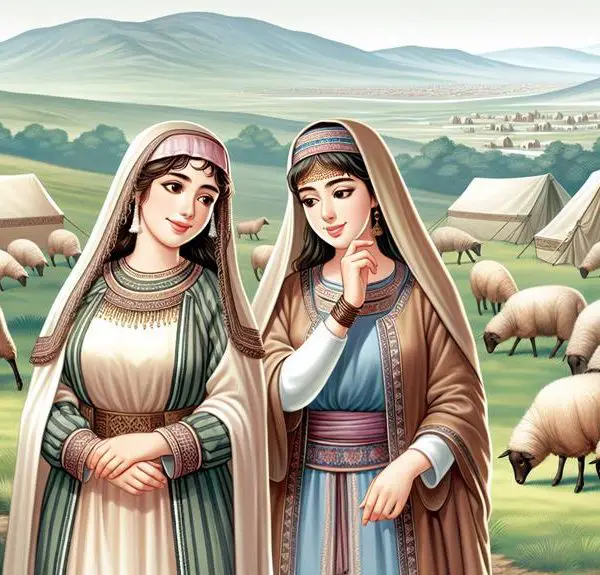

Sign up